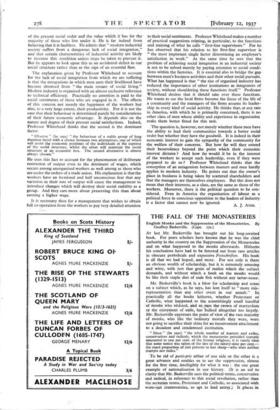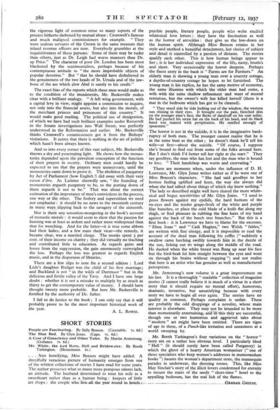English Monks and the Suppression of the Monasteries. By Geoffrey
Baskerville. (Cape. t5s.)
THE FALL OF THE MONASTERIES
English Monks and the Suppression of the Monasteries. By Geoffrey Baskerville. (Cape. t5s.)
AT last Mr. Baskerville has brought out his long-awaited book. For years scholars have known that he was the chief authority in the country on the Suppression of the Monasteries
and on what happened to the monks afterwards. Hitherto his conclusions have had to be ferreted out from rare articles in obscure periodicals and expensive Festschriften. His book is all that we had hoped, and more. For not only is there an obvious wealth of scholarship, but it is extremely amusing and witty, with just that grain of malice which the subject demands, and without which a book on the monks would. be like their staple diet of stale fish without any tartar-sauce.
Mr. Baskerville's book is a blow for scholarship and sense on a subject which, as he says, has lent itself to " more mis- representation than any other event in our annals." In practically all the books hitherto, whether Protestant or Catholic, what happened. to the astonishingly small handful • of monks who resisted, and so won the crown of martyrdom or the enjoyment of exile, has 'bulked altogether too largely. Mr. Baskerville expresses the point of view of the vast majority of monks, who like the 'ordinary mortals they were, were not going to sacrifice their skins for an inconvenient attachment to a decadent and condemned institution.
" Since " (he says) " the whole number of martyrs and exiles, conservatives and radicals, which the monasteries provided scarcely amounted to one per cent. of the former religious, it is surely time that some notice was taken of the fate of the ninety-nine per cent.— the exact proportion of just persons to lost sheep—who were neither martyrs nor exiles."
To be rid of parti-pth either of one side or the other is a great advance and enables us to see the suppression, almost for the first time, intelligibly for what it was : the one great
example of nationalisation in our history. (It is an aid to clarity that Mr. Baskerville uses the political terms, conservative and radical, in reference to this social revolution, rather than the sectarian terms, Protestant and Catholic, so associated with worn-qut controversies, so apt to lead astray.) It places in
the vigorous light of common sense so many aspects of the process hitherto darkened by mutual abuse : Cromwell's famous and much maligned commissioners for example. " They were zealous servants of the Crown in the same measure that inland revenue officers are now.- Everybody grumbles at the inquisitiveness of these persons: 'Some of them may be ruder than others, just as Dr. Leigh had worse manners than Dr. ap Price." The character of poor Dr. London has been most blackened by the sentimentalists, perhaps _ because of his contemptuous attitude to " the more improbable objects of popular devotion." But " that he shoUld have disbelieved in the genuineness of the two heads of St. Ursula and of jaw- bone of the ass which slew Abel is surely to his credit."
The exact bias.of the reports which these men would make as to the condition of the nionaisterids, Mr. Baskerville makes clear with a brilliant analogy. " A left wing government, with a capital levy in view, might appoint a commission to inquire, not only into the financial assets, but also into the morals, of the merchant princes and princesses of this country." It would make good reading. The political use of denigration, of which we have had such .brilliant examples under Roosevelt in the Senate investigations into Wall Street, was perfectly understood in the Reformation and earlier. Mr. Baskerville thinks Cromwell's commissioners got. it from the Bishops' visitations. It seems that there is nothing in the art of politics which hasn't been always known.
And so into every corner Of this vast subject, Mr. Baskerville throws a dry and penetrating light. He shows how the monas- teries depended upon the prevalent conception of the function of their prayers in -society. Ordinary men could hardly be expected to see. that the prayers were unnecessary, until the monasteries came 'down to prove it. The abOlition of purgatory by Act of Parliament (how English !) did away with their very raison d'être. As Latimer shrewdly saw, " the founding of monasteries argueth purgatory to be, so the putting down of them argueth it not to be." That was about the correct estimation of the importance of men's convictions in the process, one way or the other. The foolery and Superstition we need not emphasise : it should be no news to the twentieth century in many ways gipping back to the savagery of the sixteenth.
Nor is there any sensation-mongering in the book's account of monastic morals : it would seem to show that the passion for hunting was at least as ardent and rather more widespread than that for wenching. And for the latter—it is true some abbots had their ladies; and a few nuns their vicar—the remedy,' it became clear, was a married clergy. The monks spent 3 per cent. of their income on chirity ; they did virtually no teaching and contributed little to education. As regards gains and losses from the suppression, the gain enormously outweighed the loss. Perhaps the loss was greatest as regards English music, and in the dispersion of libraries:- _
There are a few slips to note for a second -edition : Lord Lisle's daughter Bridget was the child of his first marriage; and Buckland is not " in the wilds of Dartmoor " but in the delicious and fertile valley of the Tavy. And I have one large doubt : whether it is not a mistake to multiply by as much as thirty to get the contemporary value of money. I should have thought twenty more probable. But here Mr. Baskerville is fortified by the authority of Dr. Salter.
I fail to do Justice to the book ; I can only say that it will probably prove to be the most important historical work of the year.
A. L. Rowse.















































 Previous page
Previous page